Logistics is becoming more and more ecological. Maersk supports companies on oceans and on land
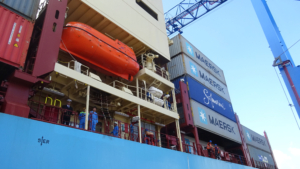
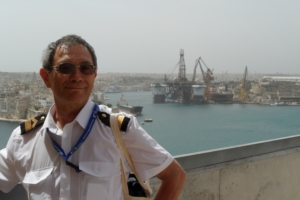 By Marek Grzybowski
By Marek Grzybowski
Logistics operators are taking large-scale actions to eliminate greenhouse gas (GHG) emissions from supply chains. The latest data from Maersk ECO Delivery Ocean proves that this trend is already widespread. In 2022, Maersk transported 480,000. TEU in ships powered by ecological fuels. In 2023, ecological container ships already transported 660,000. TEU.
Some of these containers also reached the Baltic Hub and container terminals in Gdynia. In this way, global companies operating in Poland as well as Polish ports and forwarders also joined the process of decarbonizing transport and reducing greenhouse gas emissions.
In 2023, 212 customers chose to use ECO Delivery Ocean for their marine cargo and reduced emissions by over 683,000 tonnes. tons of greenhouse gases released into the atmosphere by container ship chimneys – Maersk informs in its latest announcement. Pioneers in reducing greenhouse gas emissions are companies from the retail, fashion, automotive and FMCG industries. Maersk’s initiative included, among others: Volvo.
– We are constantly exploring sustainable development opportunities throughout our supply chain and throughout our operations, aiming to become a climate-neutral company by 2040, says Javier Varela, Volvo Global Head of Industrial Operations and Quality.
– By switching to renewable fuels, we have achieved an immediate reduction in CO₂ emissions from fossil fuels in intercontinental maritime transport by at least 84%. This initiative shows that we can act now and implement solutions that bring significant results, emphasizes Varela. Last July, Volvo Cars announced a partnership with Maersk to use the ECO Delivery Ocean concept on a large scale.
Maersk ECO Delivery Ocean is a solution used specifically for sea cargo. The operator emphasizes that it has an established and independently certified product that reduces greenhouse gas emissions in ocean transport by over 80%.

Eco in logistic chains
– From the beginning, we had many customers who tried ECO Delivery Ocean for the first time for some cargoes – says Maja Nyvold, Head of Surcharges, Value Adding Services and Energy, Ocean business segment, Maersk, and emphasizes that when they realized how well it works, more and more customers have either increased their cargo volume or even committed to shipping 100% of their cargo by sea on Maersk vessels with the help of ECO Delivery Ocean.
– These 100% contracts brought really big smiles to the faces of my team members as we saw that this was a breakthrough in something that was really changing our climate – boasts Nyvold.
Mai Nyvold’s team developed the ECO Delivery Ocean service together with other Maersk experts already in 2017/18 and introduced it to the market in 2019. The growing number of these 100% commitments is an amazing trend and the commitment of our customers, because eco-friendly fuels are much more expensive than fuels fossil – Nyvold says with satisfaction.
The pioneers of full commitment
in the development of trends related to the development of ecological transport were global brands such as Nestlé, Inditex, Novo Nordisk. 100% of their marketing logistics is handled by Maersk as part of ECO Delivery. In turn, Volvo Cars carries out 100% of the logistics of supplying components for production as part of ECO Delivery. Maersk’s solution is also used by regional brands such as Danish and Norwegian retail companies Flying Tiger Copenhagen and Europris.
Large retail chains, such as Action from the Netherlands, have joined the use of ECO Delivery Ocean in the new year, with 100% of their volume using ocean transport. ICA from Sweden recommends 100% of its long-distance shipments via the ECO Delivery system. The chemical company Borregard from Norway sends 100% of its cargo by sea under the supervision of ECO Delivery. Borregard, together with Maersk, is taking the next step. Both companies have initiated a pilot study of the use of e-trucks for land transport.
– Achieving zero emissions requires changing many aspects of how we source, produce and distribute our products. The agreements we have signed with Maersk will help reduce emissions and have an immediate positive impact on our carbon footprint, says Stephanie Hart, Global Head of Operations at Nestlé, informing that she will use 100% of ECO Delivery Ocean.

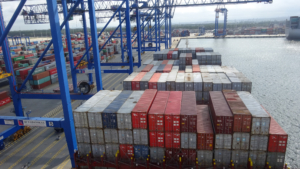
Biodiesel and ecological methanol on course
Maersk ECO Delivery Ocean is a service that replaces fossil fuels with eco-friendly fuels such as biodiesel and eco-friendly methanol. Biodiesel is obtained exclusively from waste streams and reduces greenhouse gas emissions by over 80%. The world’s first methanol-powered feeder container ship, Laura Maersk (2,100 TEU), was received from the shipyard by the shipowner in July last year. The baptism took place in Copenhagen, and Ursula von der Leyen broke a bottle of champagne on the side of the ship. We wrote about it here: [https://www.gospodarkamorska.pl/historyczny-moment-chrzest-pierskiego-kontenerowca-napedzanego-methanolem-od-maersk-73525].
With the deployment and naming of the world’s first methanol-powered container ship in September 2023, the shipowner also introduced ecological methanol to power the ship. The operator emphasizes that “So far, greenhouse gas reductions for green methanol are still lower than for biofuels.”
It is noted that with the commencement of e-methanol production on an industrial scale, the emission of harmful substances should increase to over 90%. The condition is the optimization of the entire process from production to use in the engine. Greenhouse gas reduction is calculated taking into account emissions related to the acquisition, production and transport of ingredients and ecological fuels. Therefore, the entire “life cycle” of methanol is taken into account.
Another ship with methanol-powered engines is the Ane Maersk container ship (16,592 TEU), baptized in January 2024, which called at the Moroccan terminal in the port of Tanger Med on the Mediterranean Sea. The ship, 351 m long and 54 m wide, entered service in March this year. Today, it is the largest container ship that uses ecological methanol. We wrote about it here
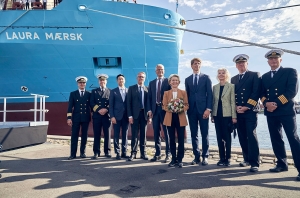
More and more conscious forwarders
– We see that more and more freight forwarders consciously cooperate with supply chain partners who can today help realize their climate ambitions with effective solutions. We are proud that we can help our customers reduce greenhouse gas emissions, says Kaisa Helena Tikk, who leads the commercial sustainability team at Maersk.
She highlights that the increased need for reliable data to support science-based emissions reduction targets is also an important factor.
More than a month ago, Maja Nyvold announced on a social networking site that more than half of the 200 largest customers had joined the Maersk program. She says this makes Maersk the first company to have climate targets endorsed under the Science Based Targets initiative in line with the new maritime guidelines, and our ambitions for 2040 are underpinned by concrete targets and public accountability.
Nyvold emphasizes the role of partners in the decarbonization of maritime transport. He notes that “Winning the net zero endgame is not something we can do alone – it requires an entire ecosystem, and our customers play an important role in that. We are committed to delivering low carbon products and solutions, but for each of us to succeed, we also need our customers to engage and demonstrate commitment.”
– Don’t hesitate to contact us if you want to discuss how we can support the decarbonization of your supply chains using the hashtag #ECODelivey and help each other achieve our goals, Nyvold urges.
#ECODelivey from Maersk is a solution for shippers to obtain a comprehensive overview of emissions across all carriers and transport modes. Consolidated data allows you to take the best and most effective actions to reduce greenhouse gas emissions in the next step. The general reporting requirements in this area are another important aspect for clients. Kaisa emphasizes that nowadays a logistics partner must be able to provide cargo owners with reliable and robust emissions data.
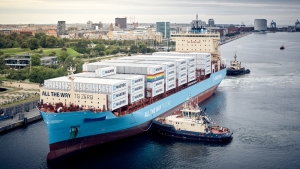
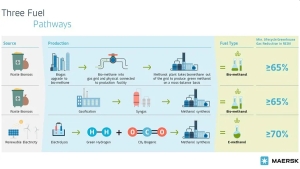
Over 50 thousand TEU on eco-ships
Some of our customers using Maersk ECO Delivery Ocean are already sending over 50,000. containers per year on ships using ecological fuels. Maersk emphasizes that it has enough green fuel to meet the growing ambitions of all customers to decarbonize ocean and land transport.
– In 2023, we continued to expand our global biodiesel supply infrastructure to key bunkering hubs in Europe and Asia. We will continue to rely on biodiesel as the basis of our green fuel portfolio, while increasing the supply of other green fuels such as green methanol, says Emma Mazhari, Head of Energy Markets, Maersk’s Energy Transition department.
It announces that Maersk is investing in new methanol-powered ships, the first eight of which have a deadweight capacity of 16,000. TEUs will join Maersk’s fleet in 2024. – All ecological fuels we use for low- and very low-emission ocean transport are certified to ensure fully traceable and responsible raw materials and sources of supply – emphasizes Mazhari.
– Customers benefit because their ECO Delivery Ocean shipments are exempt from Maersk fees under the EU Emissions Trading Scheme (ETS) – Mazhari explains the economic benefits of shipping goods on eco-friendly ships.
While ECO Delivery Ocean is developing on an increasingly larger scale, the teams of Maji, Kaisa and Emma, as well as several other colleagues from Maersk, are already working on the next steps beyond low-emission maritime transport – emphasizes the Danish operator and informs about the next steps.
ECO Delivery Inland
Listening to customer needs, Maersk introduced the ECO Delivery Inland product in selected U.S. locations in 2023, using its own and leased electric trucks. In addition, Maersk and its partners have started implementing heavy electric trucks in Germany, Norway, Sweden, the UK and China, as well as pilots in Brazil.
In 2022, Maersk announced that it had set a goal of achieving net zero emissions by 2040 across its entire operations. Its achievement will be facilitated by short-term actions implemented until 2030. They assume a 50% reduction in emissions per transported container in the Maersk Ocean fleet compared to 2020. The operator from Copenhagen has decided to order ships that will be powered exclusively by ecological fuels.
At the end of 2022, Maersk ordered six large ocean-going ships that will have engines powered by eco-friendly methanol. The six units will be built by Hyundai Heavy Industries (HHI) and will have a capacity of approximately 17,000 TEU. In total, Maersk will put into operation 19 ships with dual-fuel engines that can run on ecological methanol.
